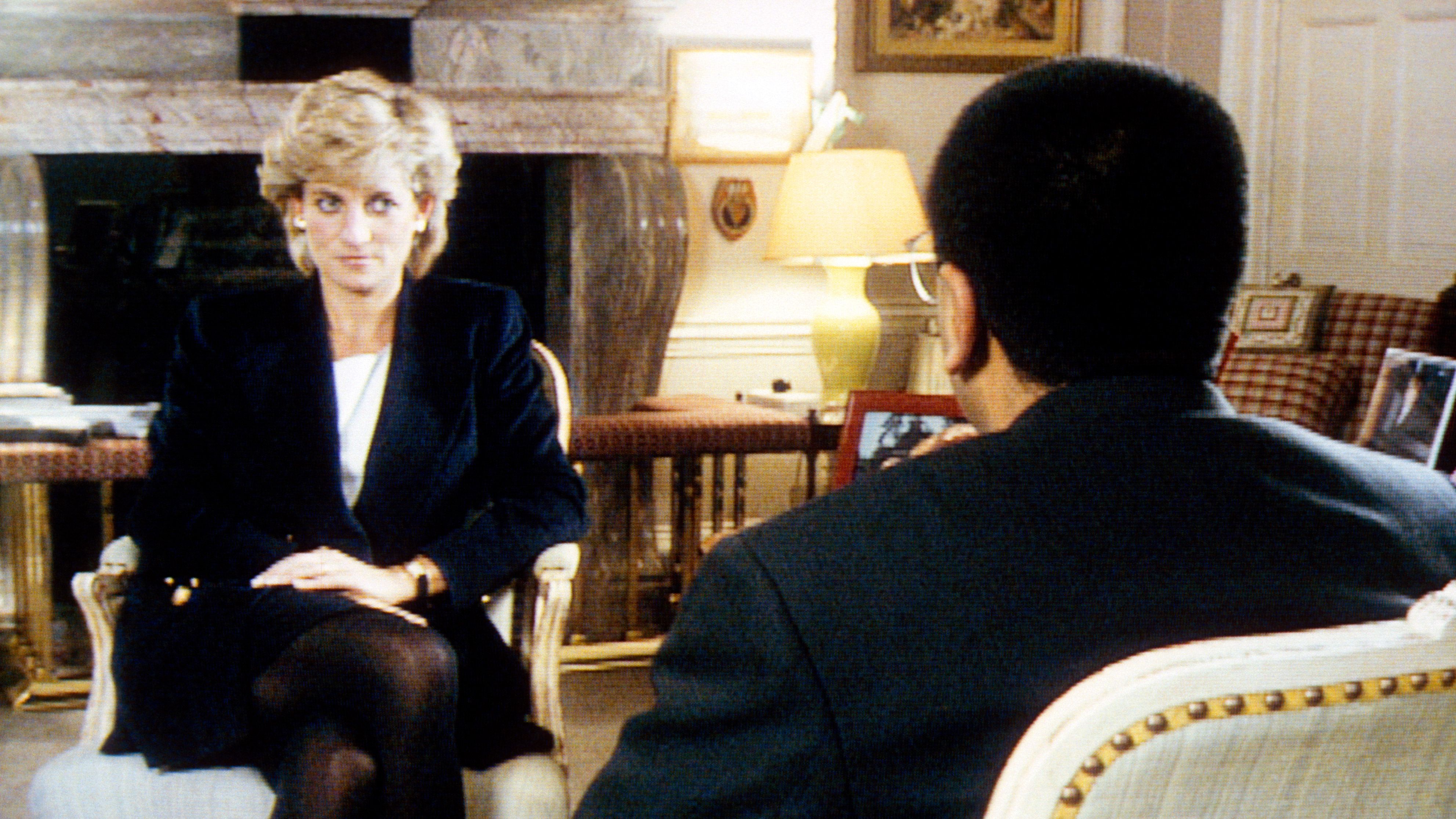Meghan Markle's Oprah Interview Is Eerily Reminiscent of Princess Diana's 1995 BBC Sit-Down
The palace has established a pattern of making royal spouses feel completely isolated.


TRIGGER WARNING: The below story contains a description of suicidal ideation. This content may be triggering for some readers.
Meghan Markle and Prince Harry's primetime interview with Oprah Winfrey felt groundbreaking, and it certainly was, especially in the couple's descriptions of feeling abandoned by the royal family, in Meghan's brave decision to speak openly about her mental health struggles, and in their shocking claim that conversations had taken place within "The Firm" about their son Archie's skin color. At the same time, however, the interview was made even more devastating by how disturbingly similar it was to the one Princess Diana gave to the BBC's Martin Bashir nearly three decades prior, in 1995.
In that interview, conducted less than two years before her untimely death—and secured by Bashir under deceptive circumstances, but that's a whole other story—Diana, too, dropped bombshell after bombshell about her and her husband's extramarital affairs and about her own deteriorating mental health. In the case of the latter, Prince Harry seemed fully aware of the similarities between his mother's and his wife's accounts, telling Oprah, "My biggest concern was history repeating itself."
Here are the biggest parallels between Meghan and Diana's revelatory interviews, from their contents to reception.
Both interviews occurred amid a period of distancing from the royal family.
Meghan and Harry's interview, of course, comes a little over a year after they announced they were stepping back from their roles as senior working members of the royal family and moved to California to live as private citizens. As Meghan told Oprah, such an explosive interview simply couldn't have happened any earlier, while the couple was still employed by the palace and, even after stepping away, still working through the ensuing fallout.
Diana, too, felt bound by royal duty not to speak out and suffered in silence for years, but had seemingly had enough by the time she decided to sit down with Bashir. Her interview aired on November 20, 1995, more than three years after she and Prince Charles had formally separated; exactly a month later, the palace announced that Queen Elizabeth II had finally okayed their divorce.
Both described experiencing suicidal ideation.
In the CBS special, Meghan said she entered a deep depression and experienced suicidal thoughts due to the intense, constant, and often racist press scrutiny that she's faced ever since she and Harry announced their engagement; those struggles were worsened by what she and Harry perceived as a major lack of support from the royal family, even as the couple repeatedly begged for help in staving off the press and seeking treatment for Meghan's mental health.
Get exclusive access to fashion and beauty trends, hot-off-the-press celebrity news, and more.
"I just didn't see a solution. ... It was all happening just because I was breathing," Meghan told Oprah. "I was ashamed to say it at the time and ashamed to have to admit it to Harry, especially, because I know how much loss he's suffered. But I knew if I didn't say it, I'd do it. And I just didn't want to be alive anymore. And that was a very clear and real and frightening constant thought."
Diana also used her interview to open up about her mental health, a conversation that was later shown to have a significant impact in destigmatizing mental health issues in the U.K. and beyond. The Princess of Wales told Bashir she'd experienced depression, bulimia, and self-harm, and cited causes very similar to Meghan's, including rampant tabloid scrutiny, a lack of support from the palace, and an overall sense of "isolation" in her role.
"When no one listens to you, or you feel no one's listening to you, all sorts of things start to happen. For instance, you have so much pain inside yourself that you try and hurt yourself on the outside because you want help, but it's the wrong help you're asking for," Diana said. "People see it as crying wolf or attention-seeking, and they think because you're in the media all the time you've got enough 'attention.' But I was actually crying out because I wanted to get better in order to go forward and continue my duty and my role as wife, mother, Princess of Wales."
Both said they'd been thrown into the deep end by the palace.
Interestingly, Meghan and Diana both described feeling unprepared for their royal roles but still being expected to complete them perfectly. "No one sat me down with a piece of paper and said, 'This is what is expected of you,'" Diana said, explaining that she'd had to basically develop the role of Princess of Wales herself.
Even after receiving plenty of public praise for her actions and doing whatever it took to portray the royal family in the best light possible, however, Diana said the palace was never satisfied with her efforts: "I don't think many people will want me to be queen. Actually, when I say many people, I mean the establishment that I married into, because they have decided that I'm a non-starter."
Meghan also shot down the idea perpetuated by The Princess Diaries and even The Crown that royal spouses-to-be receive "princess lessons." "There was no guidance," she said. "There were certain things that you couldn't do, but you know, unlike what you see in the movies, there's no class on how to speak, how to cross your legs, how to be royal."
She, too, was met with continued indifference from royal officials even after acing every public appearance. Harry expressed confusion over the fact that his family seemed unable to recognize that his wife was "one of the greatest assets to the Commonwealth that the family could have ever wished for."
Both were met with mixed reactions.
In the aftermath of each interview, both Meghan and Diana's accounts were met with controversy. On the one hand, each received at least superficial consolations from the royal family: Diana was finally allowed to end her marriage to Charles, and Meghan and Harry's claims were met with a statement from the queen saying she was "saddened" to hear their side of the story and would address the many "concerning" issues they raised.
The public's reactions, meanwhile, were mixed. In both cases, those reactions seem to fall into two camps: Either you're horrified at how the palace treated Meghan and Diana, and are impressed by their bravery in speaking out about the unimaginable difficulties they've experienced, or you're convinced that a centuries-old, wildly outdated institution built on white privilege and forceful colonization can do no wrong and that these royal women—both with plenty to lose—are simply seeking attention. Tough choice!
If you or someone you know is at risk, call the National Suicide Prevention Lifeline at 1-800-273-TALK (8255) or text HOME to 741741 to message with a trained crisis counselor from the Crisis Text Line for free.
Andrea Park is a freelance writer for Marie Claire, where she writes mainly about pop culture, drawing on her lifelong obsessions with consuming every book, movie, and TV show she can get her hands on. Andrea is based in Chicago and graduated from Northwestern University's Medill School of Journalism and Columbia University's Graduate School of Journalism. Her byline has also appeared in W, Glamour, Teen Vogue, PEOPLE, and more.
